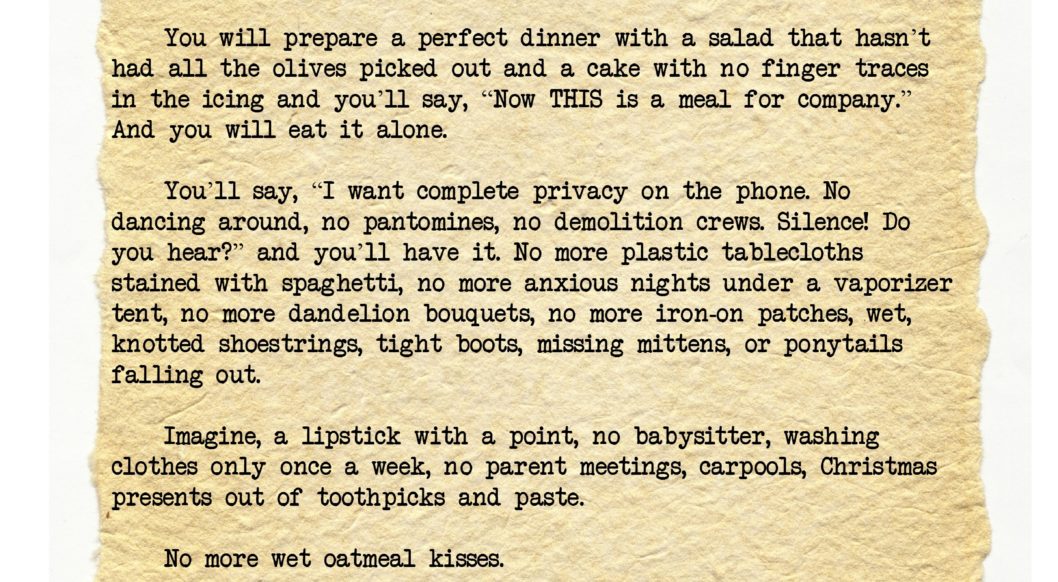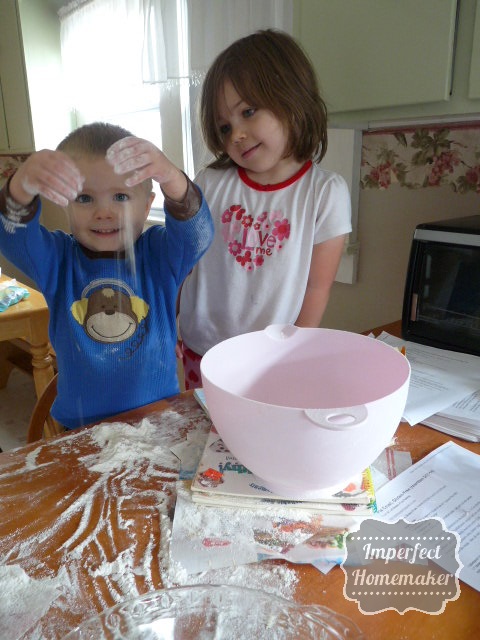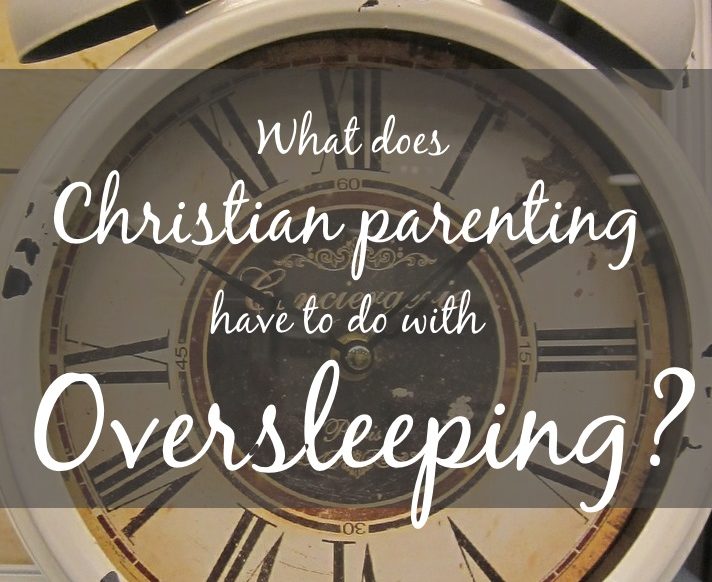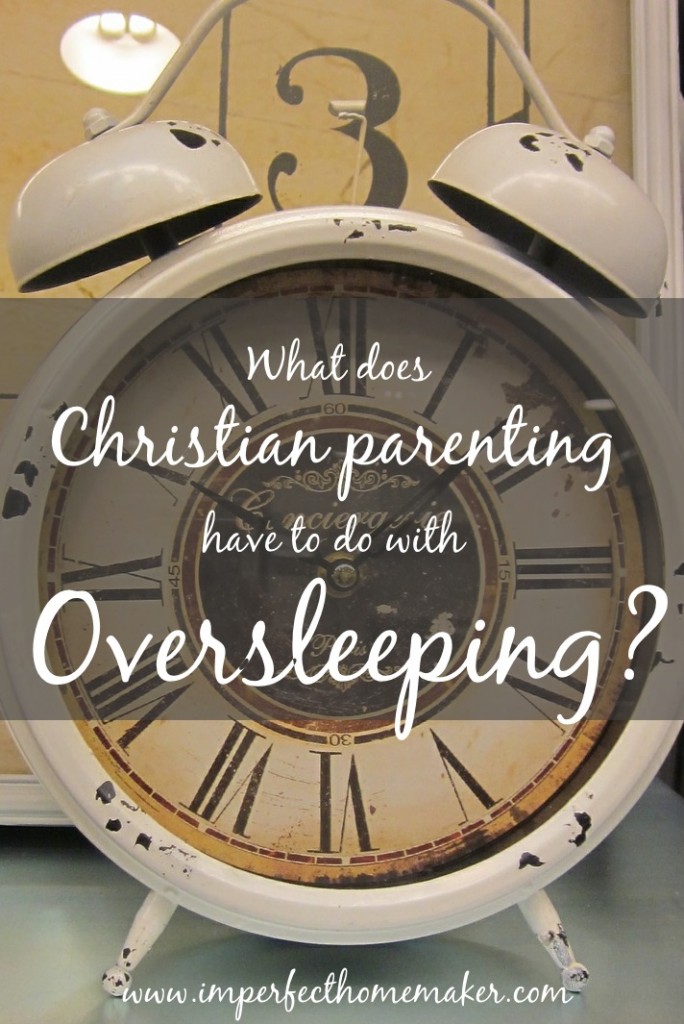Wet Oatmeal Kisses
I came across this poem in a book and it was such a powerful reminder not to wish the years away!
Know a mom who needs some encouragement? Feel free to share!
Find more mom-to-mom encouragement on Facebook:
Why I’m Okay With a Messy House
Let me fill you in on a dirty little secret.
My house stays a mess.
Like a really big mess.
Like if you come over unannounced I'll be really embarrassed mess.
But here's why I'm okay with my messy house:
1. I have a messy personality.
I'm not saying that personality is an excuse to be lazy and undisciplined. And I'm not saying it's a reason not to try to be more organized either.
But as long as I'm trying my best — working at keeping the mess cleaned up, learning better ways to keep things clean, and just generally giving it my best effort, then at the end of the day I have nothing to be ashamed of. Stressing over it and wishing things are different isn't going to change the fact that being organized isn't my strong point. (Ahem. I just smelled something strange and found a pot of rice burning on the stove that I'd completely forgotten about! But hey, at least I was trying to make dinner for my family right? There's no guilt in that!)
2. The mess means we live here.
The dishes mean I've been cooking up something for my family to eat. The craft supplies laying out mean the kids have been ultra-creative today. (We're still working on teaching them to clean up after themselves!) The shreds of ripped-up tissues (unused!) mean I have a curious little baby who gets into everything, and that's okay! She's developing into a healthy, active little girl. There's so much loud, lively chaos going on at all times of the day (and sometimes night!) that I cannot stay on top of it all. I'm just so thankful for this family God has given me!
3. I'm investing my time in teaching the kids how to clean.
I'm honestly trying to focus more of my time on teaching the kids how to clean than I am actually doing the cleaning. I'm hopeful that the time investment will pay off in the long run, and I think it will. When my 3 year old wants to help unload the dishwasher, I let him help me, even though it takes 5 times as long. When my 5 year old wants to learn how to put the dirty dishes in, I teach her how, even though it is a slow process (and even though previously mentioned baby is destroying who-knows-what while we do it.) Am I the only one who can't stand the dishwasher to be loaded the “wrong” way??
But guess who knows how to unload the dishwasher all by himself now? Or sweep the floor? Or take out the trash? Yes – my oldest who started slowing me down as soon as he started walking. But since I've taken the time to teach him these things, he can now do them – and do them properly – without any help. His younger siblings are not too far behind, although that doesn't necessarily mean they comply when asked to do a chore.
Which brings me to my final, and most important point…
4. I'm focusing my time on the eternal as opposed to the temporary.
As I've already mentioned, I am not the most organized person in the world. While some mothers are able to manage to keep their houses clean while also finding the necessary time to train their children in the things of the Lord, I – to put it simply – am not.
I've been told that my children are unusually willful. Whether or not that is true, I don't know, but I do know that their training has been immeasurably more difficult than I ever could have imagined.
Hours upon hours have been spent behind closed doors instructing my children in the way of righteousness. Sometimes I wonder if they're deaf. There are many — no, I honestly think most – days where the only thing I manage to get done is to go in and out of the bedroom correcting, teaching, and praying over children, many times disciplining for the same offense over and over and over again. (I'm told their father was rather hard-headed as a child. I'd sure be grateful if they turn out like him, but in the meantime, well – it's just flat out difficult.)
I'm unwilling to give up the fight. If I lose my children, I've lost everything. And if that means I have to give up a clean house to teach them that a life surrendered to the Lord is the only life worth living, it's a price I'm willing to pay.
I used to feel very guilty and stressed out about the constant mess (and I still do sometimes.) But for the most part, I've found joy in this place. The place of knowing that I'm fulfilling my most important calling as a mother. The calling to raise up a generation of people who love the Lord with all their heart.
Do I need to work hard to try to do both (keep things clean and spend time training my children)? Absolutely.
But if it comes down to one or the other, I'm choosing to be okay with a messy house.
(See also: Letting Go of Homemaker's Guilt)
A Letter to the Child I Never Knew
Dear Little One,
It was eight years ago today that I first learned of your existence.
It was the first Christmas your dad and I were spending as a married couple, and I was miserable. We were visiting relatives on his side of the family, aunts and uncles that I didn't know. I had a horrible head cold and wasn't feeling well. We had just finished a Christmas service at the church your dad's relatives attended and we decided to stop at the drugstore on our way back to the house and grab something for my sinuses.
As I read the instructions on the box, I joked to your dad, “It says ‘Do not take if pregnant.' I hope it's okay to take this!”
I had no idea I was pregnant. My periods were always irregular and sometimes I would skip a month, so I never even tried to keep track of whether I'd missed or not.
When we got back to the house, I started having severe abdominal cramps. “Oh great. I'm already miserable with this cold and now I'm going to start my period too!”
The cramps got worse and worse. This was the worst cramping I'd felt in a long time. And it felt a little different than usual too.
I got up to go to the bathroom, hoping to relieve some of the pressure.
I'd been in there quite a while with no relief when suddenly I felt something pop and I passed what felt like a huge clot of blood. But I immediately knew something unusual was going on. I stood up and looked into the toilet and I could see a mass of…something. I wasn't quite sure what.
I had to get down really close and look very carefully, but I could make out what seemed to be arms…or legs…or…something. Could it be?
I left the toilet unflushed and went to get your dad. He has better eyes than I do.
“I…think that's what we're seeing.” Neither of us actually said the word “baby”.
We were in disbelief at what we saw.
But we had to agree that's what it had to be.
I don't know whether I flushed the toilet or your dad, but I still feel guilty about it every time I think about it. We just didn't know what else to do with a big mass of urine, blood, toilet paper, and…a baby. I'm forcing myself to write those words. I need to.
I couldn't bring myself to use that bathroom for the rest of our visit. I felt like I was desecrating your precious body by using the bathroom in that toilet.
I cried, but not tears of grief. I cried because that is what a mother who has lost a child is supposed to do.
I hadn't learned to love you yet because I didn't even know of your existence yet until that moment.
I felt completely numb. In shock.
I also felt guilty. Guilty for taking the medicine. Guilty for flushing you down the toilet.
When we got back home from our visit, I took a pregnancy test which confirmed that there were in fact pregnancy hormones running around in my body. You hadn't been part of our imagination. You were real.
All these years I've kept pretty quiet about your existence. I've had a hard time acknowledging that you did in fact exist. The whole experience of learning of your existence, meeting you, and losing you all in one short moment left me feeling so very strange.
I never knew you.
But you are real. You are a living soul that I will one day meet in heaven.
I am your mother. You are my child.
And today I simply want to acknowledge that.
I no longer want to dismiss the value of your life simply because your birth and death were so far out of the norm.
And I hope that by writing this I can encourage other mamas who may have shared a similar experience that it's okay to acknowledge their babies. They don't have to keep quiet about it. I'd tell the world all about any of your siblings. Why should I be ashamed to talk about you too? Your life is every bit as valuable as theirs. And some day we're going to get to know one another.
Until then, I'm so glad you have a heavenly Father who loves you far more than your earthly mother and father ever could. One day I will thank him for your life.
Love,
Mommy
P.S. Today I cried. Really cried. Not because that's what someone who loses a baby is supposed to do. I cried because I love you.
Teaching Kids to be Grateful for Gifts
Teaching kids to be grateful for gifts can be a challenge sometimes!
Giving gifts to our children for Christmas or birthdays is a ton of fun — until you start hearing things like “I don't want this!” or seeing one gift hurriedly tossed aside while they ask “What else do I get?”
As much as we try to teach our children to be grateful for what they get, there is definitely a learning curve and they don't always get it the first time around! So if you're doing these things and they're still acting like spoiled brats, don't be discouraged. Keep at it, and gratefulness will begin to form into their character where they exhibit it on their own. Their heart attitude — not conformity — is the goal, and that takes time.
Below are some things we have done with our children around Christmas or birthday time to help them learn to be thankful for what they receive. All of these require learning to place others before themselves.
Disappointing gift? If they've learned to put others first, they can refrain from making rude comments that would hurt the giver's feelings.
Expecting more presents? Learning to put others first means they learn to put their focus on what they can give to someone else instead of what others can give to them.

1. Prepare them ahead of time.
I hate it when we go to a family gathering and I realize I haven't talked to my children ahead of time to remind them to say thank you when someone gives them a gift and to keep the “I don't like this!” comments inside their head. I try to remember to talk to them before gift opening time so they can be prepared to respond appropriately when given a gift.
2. Have them say thank you.
Even if you forgot to remind them ahead of time, make sure your children say thank you for every single gift they receive. Stay nearby while they are opening gifts so you can make sure this happens.
3. Have them write a thank you note.
Besides saying thank you verbally, have your children write a thank you note after the fact. For very young children, you can write the thank-you note for them and have them sign their own name. The note should include some reason they like their gift, and if they honestly don't like it, help them think of a way to express gratefulness anyway. (“I'm so glad you were thinking of me!” or something similar.)
4. Do not allow complaining.
If you ever hear the “I don't like this!” comments coming from your child, deal with it immediately. Pull your child aside and remind them that gratefulness is a choice. Encourage them to focus on the positive. (“Maybe that gift from Aunt Sally was disappointing, but let's think of something for which to be thankful. You have a lot of people in this room who love you very much. Things will wear out or you'll get tired of them, but a family who loves you is priceless.”)
5. Focus on giving; not getting.
At Christmas, keep the focus on what they can give to others; not on what they're going to get. When they've carefully thought of others, the excitement shifts from opening their own presents to watching others open theirs.
6. Open presents slowly, savoring each one.
Rather than allowing a free-for-all, paper-ripping frenzy, have your children open gifts one at a time. This keeps things quiet enough where they can say thank you for each gift and to pay attention to it long enough to be glad for it even if that's the only thing they get.
7. Don't make the presents the main thing.
Make the fun of Christmas or birthdays be the other activities that bring your family together. The presents are just a bonus!
8. Address displays of ungratefulness and praise good efforts toward being grateful.
After the presents have all been unwrapped and the celebration is over, sit down with your child and have them think about their behavior. “You told Aunt Sally thank you for the sweater she got you, but you threw it to the side and busted into another gift before you'd really even looked at it. Do you think that was really being thankful?” or “I know you were disappointed that you didn't get the gift you were hoping to, but you still chose to be thankful for what you got. Good job!”
When you do these things year after year, your children will come to understand that they need to be grateful for every gift they receive. It's okay to be disappointed if something isn't exactly what you want, but you can still make a deliberate choice to be grateful for it anyway. It's not about pretending; it's about truly recognizing all the good things we do have. If someone gets you something really nice — fabulous! If someone gets you something not-so-nice — it's okay! You can still be polite and say thank you, recognizing that they gave you a gift because they love you.
Let's train up a generation of less entitled kids and more grateful kids!
GRACE for the Stressed Out Mama
Before I got married I had visions of what our family would be like. Mommy would be humming cheerfully while the kiddos helped her make cookies in her sparkling clean kitchen.
Instead, I find myself in situations far different than what I envisioned. In fact, our latest baking enterprise turned out like this:
Yes, all mommy has to do is step into the bathroom or go change the baby's diaper and it seems like all hell has broken loose by the time I return.
Moms, I get what it's like. Oh, I SO GET IT!
You want to be a happy mom and do fun stuff with your kids.
You want to cook nutritious meals and bake yummy treats.
You want to serve at church and keep your house clean and serve your neighbors and keep yourself looking nice for your husband and…and…and…
But it seems like everywhere you turn there are obstacles in your way.
Little people dump out what you're baking.
The food you cook gets burned and you have to serve your family cereal for dinner.
You're tired out with a teething baby and you're having to drag yourself through the housework.
“THIS WASN'T HOW IT WAS SUPPOSED TO BE!” you're thinking.
Homemaking was supposed to be fun. I was supposed to be a cheerful wife and mom, enjoying being here for my family, but instead I am one STRESSED-OUT, FRAZZLED MESS!
You know what you need? A good dose of GRACE.
Here's how I find grace in the stressful seasons:
G – Get some rest
When you're tired, your emotional sensitivity level shoots through the roof and your patience level fizzles out to nearly zero. Instead of sweetly letting your children help you stir the cookies dough, you find yourself hollering about the flour they spilled (or purposely dumped. ahem.) “Where did that even come from?” you wonder. “Why I am hollering at my babies?” It's time to get some rest, mama. Get everybody down for a nap and go take one yourself. If that's not possible, get them to bed early and GO TO BED yourself.
R – Read your Bible
When I find I'm acting like a bear, I often realize I've been so busy that I haven't spent much time with the Lord. Instead of letting the sweetness of the Spirit of God fill my soul, I've been letting the worries of everything I have to get done fill my mind. When the clock is ticking away and my agenda isn't getting completed, I find myself getting more and more frustrated and stressed until I eventually explode under the pressure. Sometimes that's simply because I haven't asked him whether what's on my list is what He really wants me to accomplish. Sometimes there are things that must be completed within a certain timeframe, but I'm trying to accomplish them in my own power. When I feel the pressure, it's time for me to step away from my worry and step into the presence of God. (See also: Finding Time for God When You Can Hardly Find Time to Breathe)
A – Abandon failed projects
Just because you think a good mom makes cookies with her kids doesn't mean you're a bad mom if you don't. If you're the type of mom who gets aggravated at spilled flour, then give up on the cookie idea. Your kids would rather have a happy mom who doesn't get herself all worked up.
If you've been asked to bring a pie to the family gathering and it's taking you all. day. long. to get the thing made with all the interruptions (true story), you can do one of two things: 1. Don't bring the pie and say “I'm sorry I wasn't able to get the pie done.” or 2. Go to the grocery store and buy a pie, put it on a nice plate, and keep your mouth shut about where it came from. It doesn't make you a failure. Who cares if other people think you should be able to get it done. You know you can't get it done without making your family miserable with your stress. They're more important than what everybody else thinks.
C – Cue the music
There was a reason David was brought in to play music for Saul when he would get so enraged. Music soothes the soul. When you're feeling stressed and snippy with your family, turn on some relaxing, soul-strengthening music. Your disposition will improve immensely.
E – Embrace reality
Be who you are, not who everybody else thinks you should be or what you've envisioned you would be in the past.
If it's not your thing to make cookies with the kids, don't force yourself to make cookies with the kids and end up being a grouch because it frazzles you.
If you burned dinner and had to feed the family cereal, don't worry about it. At least you're putting something in their bellies.
If you struggle with keeping the house clean, but you give it your best shot, don't look around and beat yourself up for being such a failure. “Other moms manage to keep their house clean. I am such a loser.”
No you're not. You're you. You've got a unique personality, and you are loving your family in the way that only you can.
Stop wishing you were like this or that other person. Be the wife and mom God made you to be and embrace it with joy.
Give yourself some GRACE, mama.
Find more mom-to-mom encouragement on Facebook:
Parent Like You’ve Overslept (Christian Parenting)
What does Christian parenting have to do with oversleeping?
“Oh no! The alarm didn't go off and now we have to leave in less than an hour!”
Ever been there on a Sunday morning? My husband and I have.
We dash to the kids' rooms and start throwing their covers off. “Quick! Get up! Go potty right away and head to the breakfast table. I'll set out a granola bar for you. Scarf it down as quickly as possible, wash your hands, and in the meantime I'll lay your clothes out on your bed. Get yourself dressed, put your shoes on, and start brushing your hair.”
While the kids eat a granola bar or some other hastily thrown together “breakfast”, we do as promised and lay out their clothes so they can go straight to their rooms to get dressed. Somewhere in the mayhem we try to find a second to sneak into our room and throw on our own clothes.
I head to the bathroom to put some order to my hair and simultaneously holler out instructions to the kids. “Yes, sweetie, you put your undershirt on first. Whoops, go switch your shoes around; they're on the wrong feet.” I can hear my husband telling a boy to stand still while he helps him get his belt through the belt-loops.
A quick brush of hair here, a record-breaking tying of shoes there, and somehow we all find ourselves buckled into the Suburban. My husband and I look at each other and say with a relieved sigh, “Whew. We made it.”
Almost inevitably one of us will remark on the ride to church, “How is it that on the days we wake up late we end up getting to church earlier than when we get up on time?”
As I thought about this scenario I realized that we should model our parenting after a late Sunday morning dash to church.
I couldn't help but think of Moses' mother and the few years she had to teach him about who he really was and who God is.
We become more efficient with our time when the realization of how limited it is bears down heavily upon us. (Click to tweet that.)
We knew we had to hurry or we'd be late for church. Moses' mother Jochebed knew she had to use every waking moment to instill an unshakeable foundation of faith into her son before she relinquished him to live in the Egyptian palace.
But I'm afraid our parenting ends up being patterned after a “we got up early; we've got all the time in the world” Sunday morning.
We think we've got plenty of time to teach our kids what they need to know. So we don't capitalize on every moment. We play a game on our phone when we could be teaching them a verse. We watch a movie when we could be reading the Bible as a family. “Later,” we say. “We've got plenty of time to do that.”
But in the blink of an eye we find ourselves celebrating another birthday. Our child is another year older, then another, then another. Until suddenly, eighteen birthdays have come and gone and our child is ready to leave the nest. “Wait!” we think. “There are still a lot of things you need to know! I don't think you're prepared to face the onslaughts of this wicked world!”
But it's too late, mom. It's too late, dad. Ready or not, the time of departure is here. You wasted time because you thought you had plenty of it.
How in the world was Moses' mother able to accomplish so much teaching in such a short amount of time? How did her son stand up for his faith in Jehovah when he only lived in his home for a few short years before spending the rest of his youth in the Egyptian palace?
Here is what I believe must have happened, and what we as parents in this wicked world must practice before our children leave our own homes:
1. Remove the non-essentials
When Jochebed knew how limited her time with her son would be, I doubt she spent even one single minute gossiping with the neighbors, sewing a new dress for herself, or whatever it was that Hebrew women did for entertainment.
On a late Sunday morning, my husband and I fore-go a nice breakfast, skip out on making our bed, and make do with an old hair bow for our daughter if we can't find her new one.
As a Christian parent, what can you eliminate from your life to make more time to teach your child God's Word? Do you need to delete the games off your phone or give up some of the outside activities that keep you running every night of the week?
2. Maximize every moment
Even without non-essential fluff filling up her time, Jochebed's window of opportunity for teaching her son was still severely limited. She had to maximize every moment of the day. When she was kneading bread, she was probably teaching Moses. When she was washing clothes, he was at her side learning about God. When she was sweeping the Egyptian dust from the floor of her home, she was talking to her son about Jehovah.
Deuteronomy 6:6-8 says:
And these words, which I command thee this day, shall be in thine heart: And thou shalt teach them diligently unto thy children, and shalt talk of them when thou sittest in thine house, and when thou walkest by the way, and when thou liest down, and when thou risest up. And thou shalt bind them for a sign upon thine hand, and they shall be as frontlets between thine eyes. And thou shalt write them upon the posts of thy house, and on thy gates.
No matter what we are doing, we can be teaching our children about Christ. My children often sit up on a stool while I'm cooking dinner and we memorize verses. Use every day situations to teach your children Biblical truths. When you're eating grapes, teach them that Jesus is the true vine and that they cannot do anything without him. Every moment can be used profitably, but you must constantly be watching for ways to do so.
3. Keep going even when you're tired.
Moses' parents were slaves in Egypt. No doubt they worked incredibly hard and were bone-tired pretty much all the time. But they didn't let that stop them from taking care of what was most important – teaching their child about his God.
I admit; I fall short in this area far too often. When we've been gone all day and don't get home until late, it's so tempting to send the kids straight to bed without family prayer time. Or when we're having a busy day, it's easy to skip things that would be part of normal routine, like reading the Bible together. But the hard days are really the days when we need God the most! When we say “Not today; I'm exhausted!” we are teaching our kids by our actions that we don't really need God's help.
When my child has committed the same offense 354 times in a row, I really don't feel like dealing with it any more. I'd rather go hide in my room, bury my nose in a book and forget my troubles ever existed. But those are the times my child needs instruction the most! He is obviously struggling with something, and I need to help him work through it God's way rather than leaving him to sort through it on his own. As a parent, these things are emotionally exhausting. But it's a battle you can't afford to lose! Stay in the fight!
4. Live with a sense of urgency.
Jochebed knew her days with Moses were numbered. She tried to cram in everything she possibly could to those few short years with her son.
When we wake up late on a Sunday morning, the prevailing atmosphere in our home is “Hurry, hurry, hurry! Don't talk; it will slow you down. If there is any possible way to complete any part of the morning routine faster or more efficiently, do it!”
When it comes to parenting, the sense of urgency must be the same. Don't slow down. Don't get distracted. Keep the pressure on.
Ephesians 5:15-16 See then that ye walk circumspectly, not as fools, but as wise, Redeeming the time, because the days are evil.
5. Never give up.
If we wake up late on a Sunday, we could say “Oh well. I guess we won't make it this morning. Might as well go back to bed.”
But if we did we would miss all the blessings that come from a day of worship and of fellowship with believers. (Not to mention we'd be disobedient to God's command not to forsake the assembling of ourselves together.)
The stakes are even higher when it comes to teaching our children the word of God.
There are days when I have literally said “This is impossible! My kids are not listening to a word I say!” But giving up is not the answer. To give up on teaching them the Word of God is to give up on an eternal soul!
As I close, I want to share with you the 3 things that we need to focus on teaching our children:
First, they need to have a Biblical understanding of their own personal salvation. You can teach a child to parrot phrases like, “I am a sinner.” “Sin has a penalty.” “Jesus died on the cross to pay that penalty.” “I need to trust Jesus to save me from my sins.” But if they do not know from scripture that these things are true they will never become more than just that: parroted phrases. When speaking to your child about salvation, focus more on teaching them the scriptures that point to Jesus as the only way to heaven rather than trying to get them to memorize the “right answers”.
Once your children have professed salvation through Christ, they need to know why and how to live a holy life. Again, point them to the Scriptures rather than your own words. Teach them what the Bible says they must do to be obedient (obey parents, speak the truth, be kind to others, etc.) then teach them that they cannot obey in their own strength. Teach them what the Bible says about putting off the old man and putting on the new man, about renewing their minds, and about hiding God's word in their heart that they might not sin against him. Teach them how to detect and avoid the wiles of the devil by putting on the whole armor of God.
Finally, teach them how to win the lost to Christ. God commands every believer to “preach the gospel to every creature”, and we need to send our children out equipped to do so. Teach them not just what to believe, but why they should believe it. Their beliefs will be challenged by the world, and they need to know how to defend their faith and stand boldly for the gospel.
Make scripture pre-eminent in your home.
Teach it. Memorize it. Live it.
And parent like you've overslept.
.. now it is high time to awake out of sleep: for now is our salvation nearer than when we believed. Rom. 13:11












